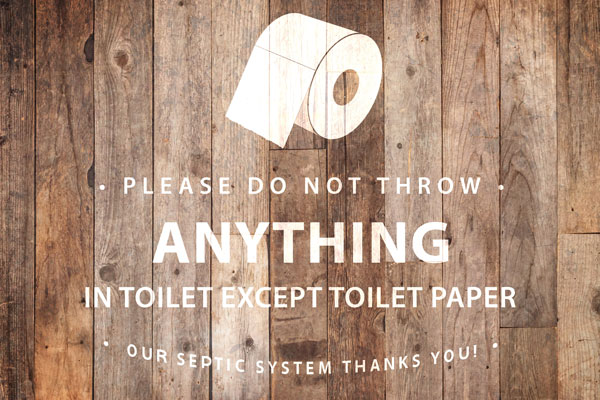Living with a Florida home septic tank can be a breeze if you just pay attention to what goes in the system and what is happening around it. The following tips will keep everything functioning normal and avoid costly repairs.
 Tips For Living With A Florida Home Septic Tank
Tips For Living With A Florida Home Septic Tank
1. Doing the Laundry
If you notice bubbles coming from under the septic cover, it might have to do with the products that you are using to clean your clothes. Fillers in powdered laundry soap can even clog the system and result in the septic backing up into the house. Use septic safe laundry soap and be aware of the amount of bleach you are using in each load. Lint could also be getting into the system and causing back-ups.
2. Septic Pumping & Cleaning
One of the best things that you can do to be proactive in your septic system care is to schedule a septic pump-out every three to five years with a local septic cleaning company. This depends on the size of the tank and the amount of usage, so if you see trouble it might be time to call in the experts earlier.
3. Knowing The Signs of Home Septic Tank Problems
One of the best things that you can do at the first sign of septic troubles is get a septic repair company to your house for an inspection. The inspection will allow the team to identify a problem and get it fixed before bigger issues result. If the tank fails, the run off could negatively impact streams, lakes, and wells. This is a major health hazard that could be a very expensive lesson if you are not taking proactive measures. The best thing to do is reach out for help at the very first sign of trouble, regardless how small.
4. Excessive Rainwater
One thing Florida has is a serious summer rainy season! There are some months where it seems like it rains for weeks on end, and this can be a problem if you have a septic tank system. A soggy drain-field will not be able to properly absorb and then neutralize liquid waste, so it is important you find ways to divert excess rainwater.
Rain barrels can collect extra water, as well as down spouts that are directed to other areas of the property. Any thing that you can do to divert excess water from reaching the drain-field will help to allow the septic system to operate properly.
5. The Green Grass
One of the best ways to tell that there might be trouble with your septic system is to simply look at the grass. When you are living with a septic tank, you need to be able to spot trouble quickly, and the grass growing directly over the system will help you get a peek as to what is going on inside.
If the grass is a solid green color all the away around, things are looking good. The time to reach out to a local septic repair team is when you start to see that same grass turn brown and dry, dark in some and light in other, or with strange green stripes. Each of these color combinations can be indicative of a unique problem affecting your septic tank system.
 6. The Toilet Is Not A Trash Can
6. The Toilet Is Not A Trash Can
Part of living with a septic tank is not treating it like a garbage can. Anything other than human waste and septic safe toilet paper should never be flushed down the drain.
The short list of things to keep out of the toilet include dental floss, cat litter, sanitary napkins, disposable diaper, paper towels, cigarettes, grease, coffee grounds, and facial tissues. It only takes one of these things to clog the septic tank and result in more problems than you care to think about.
A friendly sign or poem in the bathroom can go a long way to remind visitors of how to use a Florida home septic tank.
7. The Trees And Plants In Your Yard
Trees in your yard look incredible and purify the air, but the root system is causing havoc with your septic tank system. In order to discourage the roots from damaging the septic system, keep all trees at least 100 feet from your home and septic tank. Willows can be especially aggressive, so keep these trees even further away.
Speak with the local septic repair company about which plants can be planted near the drain-field. For example, planting Echinacea over the drain-field can actually expel liquids from the soil while preventing erosion. These plants can actually help the septic drain-field to operate more effectively.
8. Conserve Water
Conserving water can prolong the life of your septic system. The reason is simple. All household water drains to the tank so less water means less work for the system (including essential bacteria and the drain field). Fixing faucet leaks right away, installing low flow toilets, and using water efficient appliances are just a few of the ways septic owners can save water.
9. Mind The Drain Field
The best way to care for the drain-field is to simply walk over it. If you notice that the ground above the drain-field feels soggy, soft, or muddy, it might be trouble, especially if it hasn’t rained in a while. Be sure to keep heavy machinery, automobiles, or anything that can compress the soil, off of that area of the yard.
10. The Garbage Disposal
Even though a garbage disposal is a great convenience and keeps a ton of waste heading to the landfill, it can double the amount of solids that are added to a septic tank system. Now is the time to really weigh the benefits of the garbage disposal because you might need the septic company to your home twice as many times to pump the tank if you want to make use of it. It might be a wise idea to create a mulch pile and throw away many of the food scraps that would have gone into the garbage disposal and then septic system.
As you can see, living with a septic tank is easy if you just take a few proactive measures to care for and extend the life of the overall septic system. If you live in the Central Florida area feel free to contact us here at Advanced Septic Services of Clermont for any of your septic service needs.

